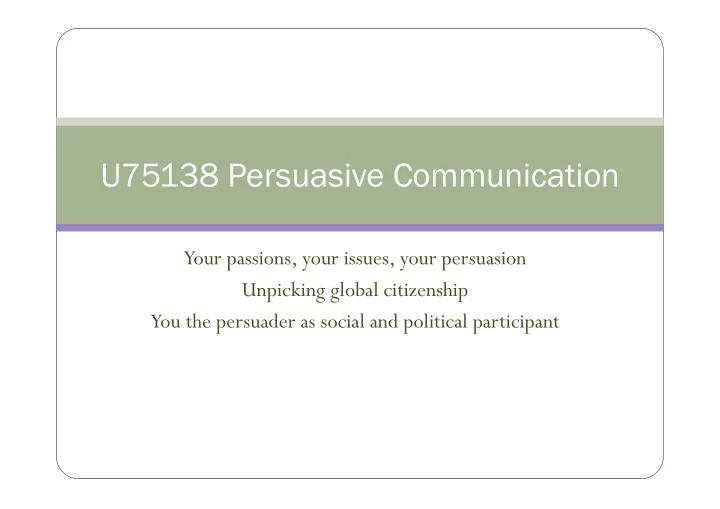

U75138 Persuasive Communication Your passions, your issues, your persuasion Unpicking global citizenship You the persuader as social and political participant
SESSION AIMS To collaboratively develop understanding of challenges world faces today and those you, the persuader, consider most important - world cafe. To relate these issues to the notion of global (cosmopolitan) citizenship and our everyday lives
Key questions What challenges is the world facing today? What and who produces these? What can be done to overcome some of these challenges?
As global citizens, we recognise we are all citizens of one planet to which we have a responsibility, whatever our beliefs
Select someone on each table to be the ‘host’ For 10 minutes, discuss the questions on the previous slide, write down key ideas and thoughts on ‘the table cloth’ Whilst the host remains in place to keep the conversation strand going, other students get up and circulate to different tables Repeat the discussion process for 10 minutes Post the tablecloths on the wall
How d do w we u und nderstand nd c citizens nshi hip? How would you define citizenship? Two different responses: Top down Bottom up
‘Traditional’ Citizenship quiz Take 10 minutes to complete the questions on the handout, and then report back
Historical perspectives on citizenship I am not an Athenian, or a Greek, but a citizen of the world ’ Socrates Cosmopolitan citizenship: Kant 1795 ‘use of the right to the earth's surface which belongs to the human race in common’ (will) ‘finally bring the human race ever closer to a cosmopolitan constitution’ Levinas (1991) and Derrida (1992) Theories of ethics and hospitality – best ways to interact with Other
Contemporary perspectives on citizenship? End of cold war Rise of global corporations, United Nations, NGOs non- government organisations Erosion of national boundaries We now live in a ‘global village(s)’ Rights and responsibilities of citizen now not confined to nation state Global citizenship an new concept, which is flawed if it does not address those who are excluded from its constituency as well as those who are included
New Rulers of the world Watch the clip from ‘ New Rulers of the World’, made by John Pilger in 2001, and think about some of the issues connecting the local to the global which link to your everyday lives .
How acti active a citizen are y you? Special edition of Le Guide du Routard produced in tourist guide format before French presidential elections in 2002. Aimed to rouse an apathetic public. Put forward threefold conception of citizenship in European liberal democracy: 1. Economic citizenship, exercised by e.g. buying Fairtrade products less likely to harm environment 2. Political citizenship, not just voting but keeping informed and questioning those in power. Relies on free availability of diverse sources including press and internet 3. Active citizenship involves working with others to defend or promote human rights and the environment.
Linki nking ng a all t ll thi his t to a a d defini nition? n? ‘There is a dynamic relationship between citizenship as status and citizenship as practice. Citizens have human agency. They feel they can make a difference. They exercise their rights by taking action ... The practice of citizenship involves solidarity with others’ Osler & Starkey 2005, p.16
Questions we need to ask as cosmopolitan/global citizens ‘if “we” were to carefully look in all our phones and computers, our coffee cups and tea cups, our pantries and our closets, or our gas tanks, we would find that our convenience continues to be part of “their” exploitation. Global poverty is not distant; it’s a part of everyone’s daily existence’ (Jefferess 2008, p.33) ‘Why is the child dying’? (Appiah 2006) ‘Our dehumanisation of the Negro then is indivisible from our dehumanisation of ourselves’ (Baldwin 1984 Darsey p. 16)
References Appiah, K. (2006) Cosmopolitanism: Ethics in a World of Strangers . New York: W .W . Norton Held, D. (2004) The Global Covenant: The Social Democratic Alternative to the Washington Consensus . Cambridge: Polity Jefferess, D. (2008) Global citizenship and the cultural politics of benevolence. Critical Literacy: Theory and Practices 2 (1), pp.27-36 Osler, R. & Starkey, H. (2005) Changing Citizenship: Democracy and Inclusion in Education . Maidenhead: Open University Press
Recommend
More recommend